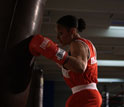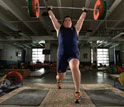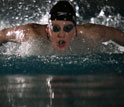News Release 12-126
Science of the Summer Olympics: Engineering in Sports
National Science Foundation, NBC News and NBC Olympics launch video series highlighting top Olympic athletes and the technology that impacts their games

The series delves into the biomechanics of athletes, and how technology builds on human achievement.
July 11, 2012
This material is available primarily for archival purposes. Telephone numbers or other contact information may be out of date; please see current contact information at media contacts.
The Olympians from Team USA heading to London in July represent not only an American commitment to athletic achievement, but also the pervasive impact of innovation.
From the devices that protect the athletes, to the mechanisms that track their races, to the systems that help them train, technologies created and guided by engineers are critical components of the Olympic experience.
For the London 2012 Olympic Games, the National Science Foundation (NSF), NBC Learn (the educational arm of NBC News) and NBC Olympics, a division of the NBC Sports Group, are launching a series of ten videos highlighting the engineering that is part of the Olympics, as told by top athletes and engineers. Watch all ten videos on the NSF website and on NSF's Science360 website.
Titled Science of the Summer Olympics: Engineering in Sports, the series is a continuation of the Emmy-winning NSF-NBC "Science of ... " partnership.
"The work of engineers not only affects Olympic sports, it also helps us perform ordinary activities in better ways," said Thomas Peterson, NSF assistant director for Engineering. "This series will illustrate how engineers can impact both sports and society, and we hope it will inspire young people to pursue engineering."
Each segment features a top athlete sharing his or her sports experiences, paired with perspectives from leading engineers about the technologies that aid the athletes or the mechanics that explain their craft.
The series is narrated by NBC Sports Group's Liam McHugh, and covers a range of events and topics. Viewers will learn how Missy Franklin cuts through water faster thanks to specially-engineered pools, how a stereoscopic camera system helps Olympic champion decathlete Bryan Clay improve his long jump, how "blades" technology helps Paralympian Oscar Pistorius compete--for the first time--against able-bodied runners in the Olympic Games, and how a pressurized treadmill system helped runner Jenny Simpson heal from injury.
The series also delves into the unique biomechanics of athletes--from the world's fastest man, Usain Bolt, to superheavyweight weightlifter Sarah Robles--and how technology still has much to learn from human achievement.
Each video segment will be available to NBC affiliate stations, and for free on the Web accompanied by an engineering-focused lesson plan for middle- and high-school teachers developed by the National Science Teachers Association.
"The Olympic Games are a time when the world gathers to watch the best athletes compete for gold, and with this new video series, people can see and learn exactly what it takes to reach the top," said Soraya Gage, executive producer of NBC Learn. "We're thrilled to continue this successful partnership with NSF and NBC Sports, to provide students and teachers with engaging content that makes learning about engineering both relevant and fun."
The segments feature some of the world's top athletes and record holders, including:
Missy Franklin, swimmer
Queen Underwood, boxer
Sarah Robles, weightlifter
Jenny Simpson, runner
Oscar Pistorius, runner
Usain Bolt, runner
Bryan Clay, decathlete
Each segment also features engineers from some of the world's top universities and institutions:
Timothy Wei, University of Nebraska-Lincoln
Anette (Peko) Hosoi, MIT
Rory Cooper, University of Pittsburgh and 1988 Paralympics bronze medalist
Nikhil Gupta, NYU-Poly
Linda Milor, Georgia Tech
Brian Zenowich, Barrett Technologies
Samuel Hamner, Stanford University
Cris Pavloff, Advanced Technology Engineer for BMW
Melvin Ramey, University of California-Davis and Biomechanist for USA Track & Field
Phil Cheetham, Senior Sport Technologist for the US Olympic Committee
The videos are archived on Science360.gov.
For more videos from the NSF-NBC partnership, see: Science of the Winter Olympics, Science of NFL Football, Science of NHL Hockey, Science Behind The News, Changing Planet and Chemistry Now.
-NSF-
-
Boxer Queen Underwood.
Credit and Larger Version -
Weightlifter Sarah Robles.
Credit and Larger Version -
Swimmer Missy Franklin.
Credit and Larger Version
Media Contacts
Joshua A. Chamot, NSF, (703) 292-7730, email: jchamot@nsf.gov
Meghan Pianta, NBC News Communications, (212) 664-2364, email: meghan.pianta@nbcuni.com
The U.S. National Science Foundation propels the nation forward by advancing fundamental research in all fields of science and engineering. NSF supports research and people by providing facilities, instruments and funding to support their ingenuity and sustain the U.S. as a global leader in research and innovation. With a fiscal year 2023 budget of $9.5 billion, NSF funds reach all 50 states through grants to nearly 2,000 colleges, universities and institutions. Each year, NSF receives more than 40,000 competitive proposals and makes about 11,000 new awards. Those awards include support for cooperative research with industry, Arctic and Antarctic research and operations, and U.S. participation in international scientific efforts.
Connect with us online
NSF website: nsf.gov
NSF News: nsf.gov/news
For News Media: nsf.gov/news/newsroom
Statistics: nsf.gov/statistics/
Awards database: nsf.gov/awardsearch/
Follow us on social
Twitter: twitter.com/NSF
Facebook: facebook.com/US.NSF
Instagram: instagram.com/nsfgov





